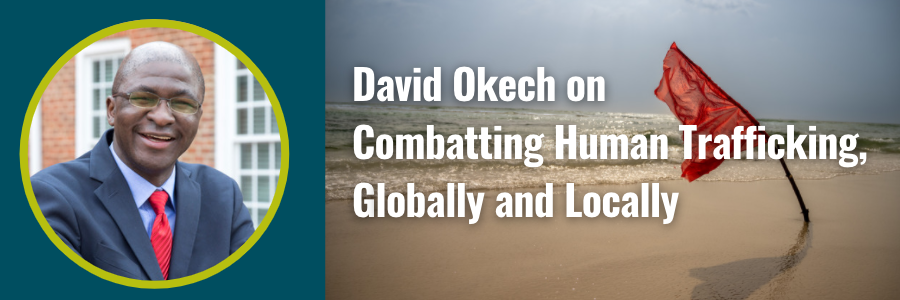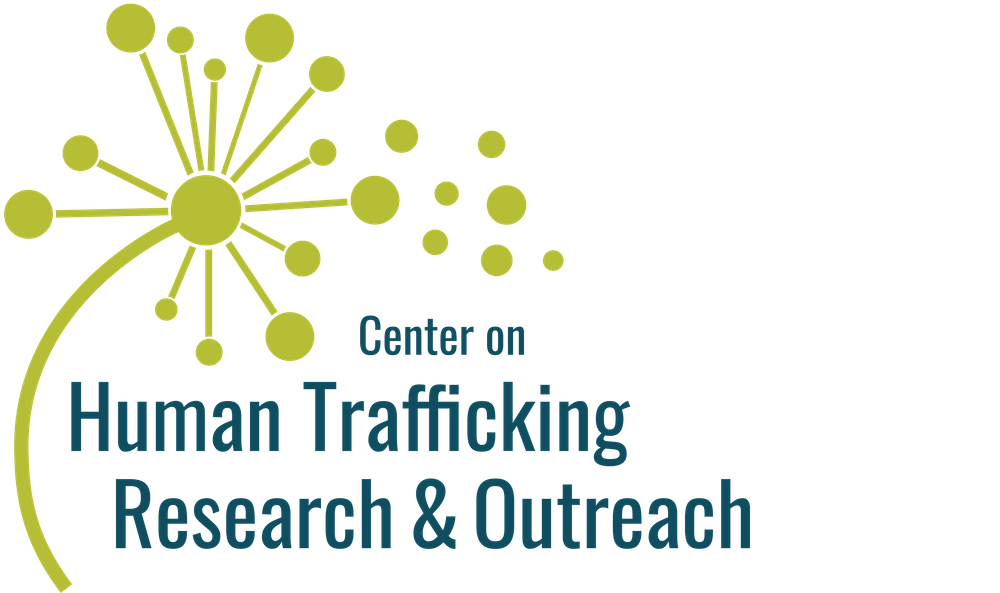David Okech Talks Combatting Human Trafficking globally and locally
Friday, March 11, 2022

Originally published by UGA Office of Research
David Okech, a professor in the School of Social Work, founded the Center on Human Trafficking Research & Outreach (CenHTRO) in 2021 as an interdisciplinary resource in the global fight against human
trafficking. Supported by over $23 million in funding from the U.S. Department of
State, CenHTRO works to improve how researchers measure human trafficking and how
governments and other entities respond to the problem.
In this interview, Okech discusses the numerous factors that complicate efforts to reduce the problem of human trafficking and why making a difference requires an all-hands-on-deck approach in research and programming.
What drew you to human trafficking research?
Initially my research was in asset building, financial capability and economic development. But in 2010, I began to take students to Ghana for a study-abroad program and interacted with Lifeline, a residential care facility for at-risk girls/women and survivors of trafficking. That program entailed meeting with survivors and victims of trafficking, and over time I developed an interest in wanting to help survivors. After I got my tenure in 2013, I decided to change my research focus to human trafficking, but maintain an economic development lens. I also wanted to conduct research in Africa because it is very under-researched. I come from that part of the world.
What are some things people might not understand about the complexity of human trafficking?
Many times when people think about human trafficking, their main understanding is that it is only sex trafficking. Human trafficking is not just sex trafficking. Human trafficking is basically the exploitation of people by unjust means for the purposes of sex or labor. Labor trafficking, in some countries, actually is more prevalent than sex trafficking.
Another confusion is with the concepts of smuggling or undocumented immigration. Smuggling is basically paying somebody to take you from point A to point B. And yes, it is possible to be trafficked while being smuggled. But smuggling alone is not human trafficking. Some people also confuse human trafficking with undocumented immigration. And yes, it is possible to be an undocumented immigrant and then become a victim of trafficking. Trafficking entails an act that is done through specific means of force or deceit for the purposes of exploitation. Traffickers abuse others’ vulnerabilities.
Human trafficking is also known as modern slavery. Sadly, more people are in slavery-like
conditions today than at any other time in the history of mankind. It is estimated
that over 40 million people today are in modern slavery. Women and children are the
most frequent victims.
What factors—social, economic, geographic—make human trafficking such a difficult problem to address?
First, it is difficult to locate victims, study them and design victim-centered programs and policies. Natural and artificial disasters like earthquakes, wars, global warming—where people are being displaced—can all increase trafficking. Gender inequalities, as well as social and cultural norms, make it especially difficult for women and children to seek their right to education and to economic empowerment, making them more vulnerable to trafficking. But the main factor we’re seeing in our work is inequality and poverty. To make an impact in reducing human trafficking, we have to reduce poverty and inequality across the globe.
What is significant about approaching the problem of human trafficking from a social work perspective?
I appreciate that social work isn’t the only profession involved in countering human trafficking. Criminal justice, public health, policy, statistics and education disciplines are not only represented at CenHTRO but are also recognized worldwide in anti-trafficking efforts. Social work is a holistic, value-based profession. The values of social justice, human dignity and human rights are part and parcel of who we are as social workers. As social workers, we believe that the victim or the survivor has strengths.
We use a framework that assesses the interaction between victims or survivors and their micro, macro and mezzo surroundings—looking at what is causing the problem and what resources are there, what impediments are around the victim/survivor. For example, a victim with less education may have fewer job opportunities. However, apart from providing those opportunities, there are other skills that the person might possess, including leadership and communication, that could be used to advance their goals.
One of CenHTRO’s main initiatives, the Prevalence Reduction Innovation Forum (PRIF), brings together researchers from multiple institutions to improve the science of human trafficking prevalence estimation. How does this work, and why is it so important to understanding the problem of human trafficking?
PRIF is the boldest effort yet globally to try to build and establish the science of prevalence estimation in the field of human trafficking. We have brought together top researchers, and we’re trying to test and validate different methods of estimating prevalence. We have seven teams in six countries—Brazil, Costa Rica, Morocco, Tunisia, Pakistan and Tanzania—all of them testing at least two to three estimation methods.
CenHTRO’s other major program, the African Programming and Research Initiative to End Slavery (APRIES), conducts research, implements programs and influences policies in sub-Saharan African, currently Senegal, Sierra Leone and Guinea. So far, what impact has APRIES had in these countries?
APRIES has made a tremendous impact within a very short period of time. In Sierra Leone, for example, we conducted the largest-scale research ever on child trafficking with a sample of 4,000 households in four districts. Apart from prevalence estimates, our findings provide guidance for producing targeted and impactful policy, programs and services for children most at risk for trafficking. We also highlight survivors’ and parents’ experiences of services, revealing potential service or policy gaps. Our engagement includes the office of Sierra Leone’s vice president all the way to grassroots leaders and survivors. We’re also building capacity by using local researchers, creating local think tanks in the area, and improving the efforts of community NGOs.
In Senegal, we had a roundtable on sex trafficking in August 2021 that brought together stakeholders from different sectors: NGOs, university researchers, government and community leaders. The way we engage, the level of research that we’re doing to inform programming and policy, monitoring and evaluation … I believe this is a great contribution to reducing trafficking. We are looking forward to doing even more.
On the domestic front, we have so far issued $45,000 to help local partners counter the problem of trafficking in Georgia and South Dakota. We are training several doctoral and master’s students in the area and provide resources to local agencies in Athens and around Georgia.
How can the public measure progress in the fight against human trafficking?
We get asked this question a lot, and it depends on where you are—trafficking takes different forms in different places. What we ask the general public to do is educate themselves on the issue because trafficking is conflated with many other constructs, as I mentioned. Knowledge of trafficking makes progress in countering the problem. Trafficking takes place in your community. Get to know about counter-trafficking organizations and their work, volunteer, and learn about the issue. We need people to learn the signs of labor trafficking and sex trafficking. We need to look out for one another.
